#coin elves
Explore tagged Tumblr posts
Text

season 3 episode 3 you will always be famous to me
original screencap under the cut ^ - ^

#happy birthday Runaan I miss you#the dragon prince#tdp#ruthari#runaan#ethari#popping the biggest bottles when they get those elves out of those damn coins in season 6
765 notes
·
View notes
Text
youtube
Y’all! More fandom nourishment 😁
#the dragon prince#tdp#aaron ehasz#justin richmond#tdp s6#tdp s7#aaravos#tdp leola#tdp callum#tdp claudia#interview by The Gaming Goji#just discovered it and wanted to share#good stuff#they talk a bit about the coins too#a lot of discussion about Aaravos and the Startouched elves#Youtube
22 notes
·
View notes
Text
"Other names in song and tale are given to these people"
From Morgoth's Ring, a list of names used to refer to the different group of Elves ; I wanted to put only the weapon-related ones originally, but the whole list is too nice :
The Vanyar are the Blessed Elves, and the Spear-Elves, the Elves of the Air, the friends of the Gods, the Holy Elves and the Immortal, and the Children of Ingwë ; they are the Fair Folk and the White.
The Noldor are the Wise, and the Golden, the Valiant, the Sword-elves, the Elves of the Earth, the Foes of Melkor, the Skilled of Hand, the Jewel-wrights, the Companions of Men, the Followers of Finwë.
The Teleri are the Foam-riders, the Singers of the Shore, the Free, and the Swift, and the Arrow-elves ; they are the Elves of the Sea, the Ship-wrights, the Swanheards, the Gatherers of Pearl, the Blue Elves, the people of Olwë.
The Nandor are the Host of Dan, the Wood-elves, the Wanderers, the Axe-elves, the Green Elves and the Brown, the Hidden People.
Those that came late to Ossiriand are the Elves of the Seven Rivers, the Singers Unseen, the Kingless, the Weaponless, and the Lost Folk, for they are now no more.
The Sindar are the Lemberi, the Lingerers ; they are the Friends of Ossë, the Elves of the Twilight, the Silvern, the Enchanters, the Wards of Melian, the Kindred of Lúthien, the people of Elwë.
Quoth Pengoloð
#silmarillion#tolkien legendarium#pengolodh#Elven names in poetry and song#The Vanyar are the spear elves so Vanyar host has lots of spears ?#If Glorfindel half Vanyar he could also have one#The Noldor have a series of very cool names - Elves of the Earth and Foes of Melkor#But the Noldor are also THE WISE !!!!#If that's not the best ironic nickname since King Demetrius Poliorcetes (“City Taker”)#Who's been known as “Poliorcetes” for over 20 centuries after he failed to take Rhodes and his enemies coined the nickname#Unless given that the Noldor are also “The Golden” and “The Companions of Men”#When they says “The Noldor” they actually mean “Finrod”#The Vanyar are not “The Golden” but “the White”#So ref to jewellery more than hair colour#Also the Sindar have no weapon mentioned at all#They are “the wards of Melian” instead#Weapons#no shitpost surprisingly
11 notes
·
View notes
Text

not to have permanent tolkien brainrot but check out this italian coin from the social war depicting an oath swearing scene between eight figures
#resurrecting tolkien like hey do you take constrictive criticism. because I think you should have gone really deep into a coinage system#invented by the noldor & all its political inplications & iconography & use or lack thereof by the other elves. hey are you listening#thoughts#tolkien#edit: wait turns out there are a lot of coins w this scene on them
157 notes
·
View notes
Text
Moonelfgender / Moonelvengender / moonelven
[Moonelfgender / Moonelvengender / moonelven]

Moonelvengender, also said as Moonelfgender or simply Moonelven, is a xenogender connected to moon elves / lunar elves in some way. This may be the Moon Elves from d&d, lunar Elven Faefolk, or any other elves connected to the moon. Someone whom is moonelvengender may feel their gender identity is tied to the species itself, their connection to the moon, their magic & spirituality, their culture, etc. They may also as well or alternatively feel that their gender is experienced not as a human gender, but as a moon elf's gender. In this case, one may substitute in an additional gender - such as moonelven boy, moonelven girl, moonelven agender, moonelven genderlune, moonelven genderfluid, etc.
Moonelvengender can be a kingender or otherwise be affected by alterhumanity, but is not exclusively as such.
The flag is a recolor of the elfgender flag, and colors were chosen based off our synesthesia!


#gender coining#mogai coining#liom coining#xeno coining#xenogender#mogai#mogai gender#mogai term#our terms#our genders#gender#our coined terms#moonelfgender#moonelvengender#moonelven#mogai community#moon elf#fae folk#elven#elves#alterhuman#otherkin#kingender
16 notes
·
View notes
Text




★ Dungeoneering Adventurer Elves ★

A flag for the elven race of dungeons and dragons
Intended use for those with elven lineage, pointy eared humans or humanoid beings, those born from descendants of feywild dwellers/natives, those who are of or identify with the elven race, those who play elven characters, fans of the race and any and all reasons tied to the elven race.

Tagging:
@sanguinaryfreaks and @hewasanamericangirl

Request status on the inbox
Please read the byf linked in fox's pinned post

#★starring dnd#flag coining#flags#flag coiner#dungeons and dragons races#dnd races#dnd#dnd species#dnd elf#dnd elves#dungeons and dragons flags#dungeons and dragons#dungeons and dragons elf#dungeons and dragons elves#elf#elf flag#elf race#elves#elves flags#elven race#flag blog#coining blog
4 notes
·
View notes
Photo

Eight of Pentacles. Art by Nara Lesser, from Neurotic Owl’s Faerytale Tarot.
Anyhoodles, the elves and the shoemaker! Seemed right for a card about mastery of a skill, and I love the inside-outness of Faerie rules where if you thank them they’re gone.
#Nara Lesser#Neurotic Owl’s Faerytale Tarot#Eight of Coins#Eight#Coins#Minor Arcana#Tarot#Folklore#the elves and the shoemaker
10 notes
·
View notes
Text
so I guess Rayla's family took the phrase "be the change you want to see in the world" a little too seriously, huh
#the dragon prince#the dragon prince season 4#rayla#runaan#moonshadow elves#tdp viren#guess he just COINED a new expression#gandhi#(i think that’s his quote?)#tdp#shitpost#wonderstorm
81 notes
·
View notes
Text

#coin pouch#larp#leather pouch#belt pouch#belt bag#elven#elvish#costume#elf#character#elves#tolkien#middle earth#high elf
3 notes
·
View notes
Text
‿ elvenic flag ‿

⇢ ˗ˏˋ elvenic ‿‿✦
╰┈➤ ❝ a xenogender in which someone identifies with elves and or the elven species in fictional media for any possible reasons (that is safe for your mental health). For example:
✦ being very attached to a elven story the identifier heard
✦ finding elves very relatable to their identity
✦ liking things such as archery, lord of the rings, DND, etc relatable to their overall gender
✦ having an alter in their system that's an elf that is connected to that part of their memory (in a healthy manner)
✦ any other (pro-recovery) reason!
(this is not for IRLS, fictionkins, or people who genuinely believe they are a fictional species or any other mentally harming / non recovery delusion)






#elvenic#elves#dnd#lotr#elf#pro xenogender#xenogender#xeno coining#mogai gender#mogai#mogai coining#mogai flag#mogai term#flags#xenogender flag#mogai flags#‧₊˚✧[alex's xeno flags]✧˚₊‧
4 notes
·
View notes
Text



ELFMASC , ELFNEU , ELFFEM : in which your gender feels masculine / neutral / feminine in the way an elf would be or present. often tied to nature,magic, and etherealness. part of my tolkien gender series
#scarecrow flags#tolkiengenders#mogai#mogai coining#xenogender#elves#tolkien#lotr#fantasy#flag making#xenogender flag
7 notes
·
View notes
Note
Who is the main leader/king/queen of Silvergrove? Or is it you?
It cannot be me anymore, little shadow. I'm in a coin, and the Moonshadow Elves of the Silvergrove do not embrace capitalism.
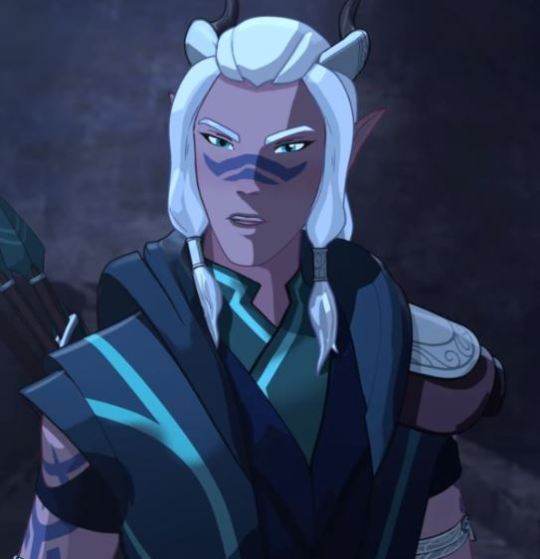
if Ethari were here he would laugh himself sick over that morbid pun, just so you know
24 notes
·
View notes
Text
i cant leave tumblr where else am i going to complain when a kids show is bad
#s.txt#CANONICALLY. IN THE TEXT. HARROW IS NOT DEAD. WHY ARE YOU BOOING ME IM RIGHT????#LIKE THEY EVEN SHOW THAT VIREN HAS MORE COINS THAN THOSE THREE ELVES....#top ten shows that hateeee when you interact w the source material....
1 note
·
View note
Text

#Photography#Dec. 2020#Indoors#Close-Up#Distance#Christmas#Winter Holiday Season#Xmas Decorations#Elves#Dinosaur#Stuffies#Plushies#Toys#Cuteness#Pennies#Coins#Silver Change#Money#Library#Counter#Carpetting#Wooden Shelves#Wooden Furniture#Woodworks#Carpets#Rugs#Shelves#Decorations#Decor#Furniture
1 note
·
View note
Text
Dragon Age: The Veilguard’s Familiar Faces and Factions
The trailer for Dragon Age: The Veilguard has dropped, and I couldn’t be more excited. It’s like a new breath of life has entered my lungs!
Within the trailer, we now have confirmation of who our seven companions are going to be, and among them are a few familiar faces from the book Dragon Age: Tevinter Nights. We also have some name-droppings of a couple factions featured in the same book and the comics, Dragon Age: The Missing. So, here is what knowledge is established about these faces sand factions.
Neve Gallus & The Shadow Dragons
Neve Gallus was first introduced in the Tevinter Nights story, “The Streets of Minrathous”. She comes off as a no-nonsense and a little intense kind of person. Neve is a Tevinter mage who works as a private investigator. For example, if someone wants some detective work done but doesn’t want the public to know, they would hire Neve. On occasion, she’s even been hired by the templars, who act like just regular cops in Tevinter – and yes, that includes their corruption and primary goal of simply protecting the elite – but Neve prefers to work alone because of that corruption, and has a personal grudge against the order for taking bribes to cover up crimes.
Neve has a prosthetic leg below the knee, made of dwarven-crafted metal.
In The Missing, Neve says she is friends with the Shadow Dragons. In the article shared by EA, as of The Veilguard, she is officially a member. The Shadow Dragons are a group of concerned Tevinter citizens who help those in need. This includes supporting escaped slaves, for example.
Emmrich Volkahrin
Emmrich Volkahrin was first introduced in the Tevinter Nights story, “Down Among the Dead Men”. He is a necromancer from Nevarra, and therefore naturally a member of the Mortalitasi – specifically, a professor in the Mourn Watch. The Watchers serve as elite guardians of the Grand Necropolis. Emmrich is on the eccentric side, personality-wise, but kindly and informal.
Emmrich has a skeleton assistant name of Manfred, who helps him with different office tasks. He also has friends in Myrna, a fellow Watcher, and Audric, a dead guardsmen who looks after the library.
Lucanis Dellamorte
Lucanis Dellamorte was first introduced in the Tevinter Nights story, “The Wigmaker Job”. He is the favourite grandson of Caterina Dellamorte, First Talon (leader) of the Antivan Crows. As such, he was raised from birth to be the perfect assassin in a ruthless and torturous environment, knowing only cruelty from his family. This has led to him feeling less like a person and more like a living weapon – and he is treated like one by everyone who knows of him. He has “the Demon” as a nickname.
I know a few people are curious about the “mage killer” title in the trailer. Rest assured that Lucanis specifically kills evil blood mages. In his own words: “If someone wants to pay me top coin to kill a bunch of racist blood mages—who have it coming—I’m not going to complain.”
Where his cousin Illario has a “silver tongue” as Lucanis puts it, he himself is a lot blunter. His reputation of a killer is spotless, except for one small problem: He has a heart under all that black leather.
Lucanis and Illario get along quite well, except for the fact that Lucanis is destined to be the next First Talon, after Caterina dies. Illario wants the job far more than Lucanis, but Lucanis isn’t sure he’s capable of making a decision for himself that goes against the wishes of the Crows.
The Veil Jumpers
The Veil Jumpers were first introduced in The Missing #3. They are a group made up of primarily Dalish elves, though also inclusive of other folks of any walks of life willing to help, working to try and control the new threats within Arlathan Forest. The forest has become a ground of chaotic magic, with the Veil so thin that time and place is jumbled together. Thus, the Veil Jumpers move in and out of the spots that bleed into one another.
The Veil Jumpers do have a headquarters called “The Sanctum”, but we know nothing else about it.
The Lords of Fortune
Despite the Lords of Fortune being mentioned in more than one Tevinter Nights story, as well as the show Dragon Age: Absolution, we don’t know a lot about them. The only concrete information provided is that they are a loose group of people who collect trinkets and glory. They come out of Rivain. They typically wear a lot of their collected trinkets like badges of honour. That’s really all there is, so I can’t wait to learn more.
1K notes
·
View notes
Text
essential reading for Kabru lovers and dunmeshi world building enthusiasts
Kabru, impossible mutual understanding & unknowable objects
Despite his concerted and constant efforts to understand other people, it’s established in a few extras that Kabru believes that true mutual understanding between certain different races is impossible. Specifically, between long-lived and short-lived races, and between humans and demi-humans. Partially, we can trace this conviction back to specific hang-ups caused by his life; the trauma of the Utaya disaster, prejudices he carries from his childhood, and his experience of racism among the elves. In this “little” essay, I’m gonna discuss how I think those experiences formed this belief, how it comes out in his actions, and how some of his actions seem to contradict it. The question of whether it’s possible to reach mutual understanding with other living beings despite our differences is one of the core themes of the manga, and I’ll also touch on how this aspect of Kabru’s character links to that.
Seeking understanding
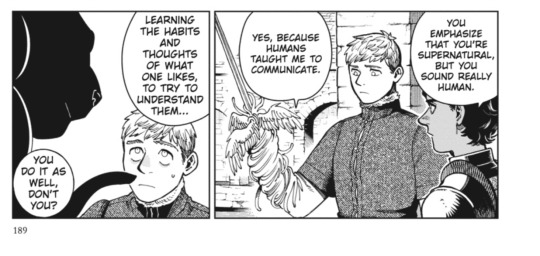
Kabru is a character who devotes a huge amount of time and effort to understanding people, and he is very good at it. In his internal monologue, we can tell how advanced and complex his skills of analysis are. He is able to read a huge amount of information just from looking at people's faces and body language.


People are, to him, what monsters are to Laios. This is something that's been expanded on at length in other, excellent meta. It's the fact that they're foils; it's the fact that Kabru is also very easy to read as autistic, with a special interest which is the opposite and parallel of Laios'. It's something that came out of trauma and alienation, as Laios' special interest in monsters also began as a coping mechanism.
The complicated origin of this "love" for monsters and for people comes through, I think, in the fact that one of the places we see both characters use their fixation is in being very, very good at killing the thing that they love. This also ties into the idea that loving something isn't even remotely mutually exclusive with using it to sustain your own survival; using it for your own purposes; hurting it or killing it. Love can be, and often is, violent, possessive and consumptive. This understanding is part of what makes Kui's depiction of interpersonal relationships so compelling to me.
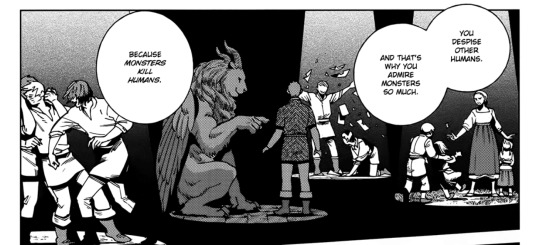
While Laios fixated on monsters and animals to seek a place of escape, in both his imagination and his self-image, from the humans who he couldn't understand and who couldn't understand him, Kabru seems to have fixated on understanding people in order to navigate the complex, socially marginal places that he has been forced into throughout his life. As an illegitimate child raised by a single mother with an appearance that marked him out as different to the point his father's family wanted to kill him, and a tallman child raised among elves who didn't treat him as fully human and wanted him to perform gratefulness for that treatment – treatment that, after he met Rin at age 9, he certainly always understood could be a lot worse – his ability to work out what people wanted from him, whether they were friendly or hostile or had ulterior motives, wasn’t just an interest. It will have been an essential skill.
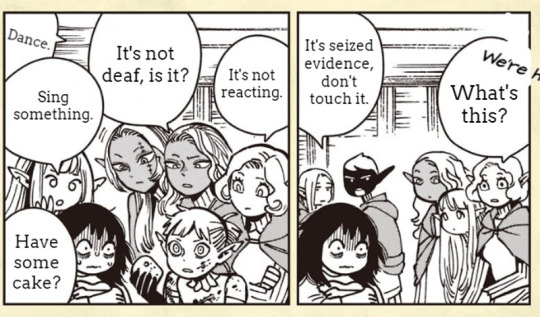
Milsiril, I think, was a flawed parent who tried to do her best by Kabru and did a lot of harm to him despite her best intentions. She may have treated him much better than an average elf would have, but like Otta and Marcille's mother, there are other elves with different outlooks on short-lived races. How would they judge her treatment of him? We don’t have any insight on what it could be, but to be honest, the person’s whose opinion of her I’d be most interested in knowing is Rin’s.
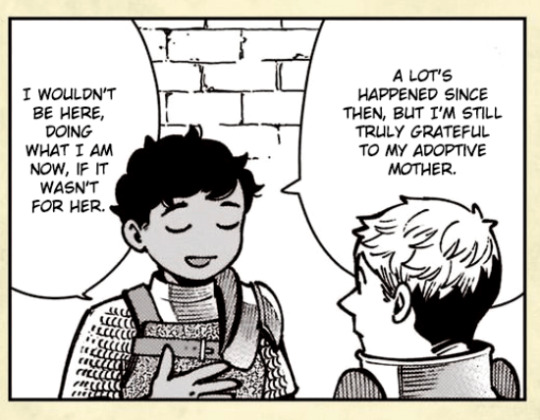
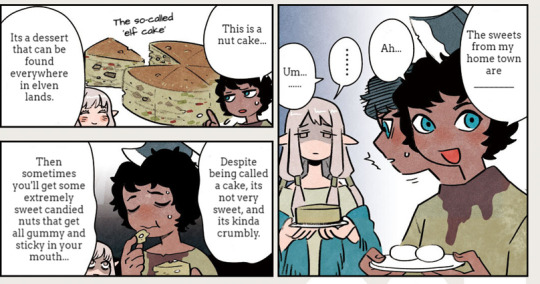
But even if she'd been perfect, living as an trans-racial adoptee in a deeply hierarchical nation with a queen who is a 'staunch traditionalist' who wouldn't even acknowledge the existence of a half-elf like Marcille (according to Cithis) is an experience that would deeply impact anyone.
Elves & Impossible mutual understanding
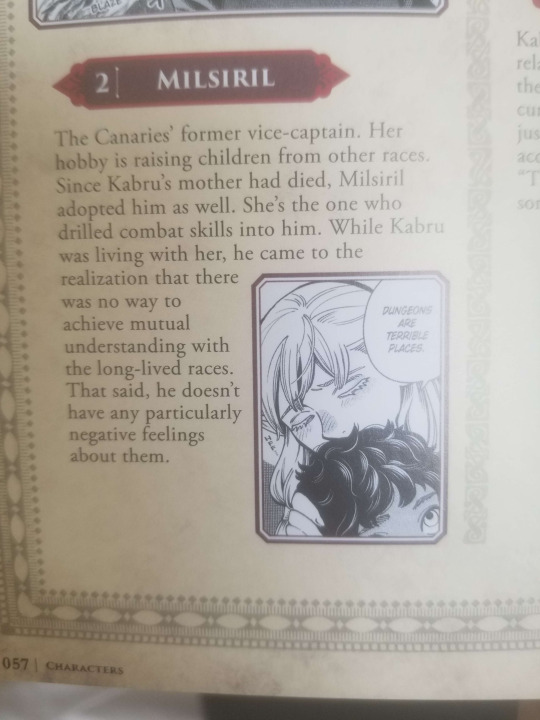
While Kabru was living with Milsiril - in other words, while living in the Northern Central Continent - he came to believe that "there was no way to achieve mutual understanding with the long-lived races."
This is evident in his political project: he wants short-lived races to have ownership over the dungeon's secrets. Despite his dislike of the Lord of the Island, he's a useful bulwark to stop the elves taking over. Despite his doubts about Laios, Laios needs to be the one to defeat the dungeon, because if he doesn't the elves will take over.
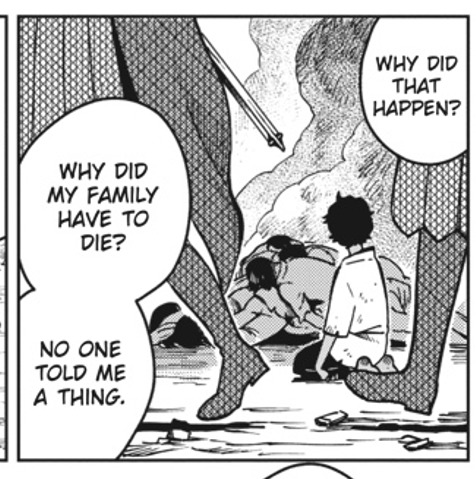
Kabru still carries a deep scar from Utaya, one that was exacerbated by the fact that he never got an answer to any of his questions about what happened or why. This, despite the fact that Milsiril knows about the demon and how it works. Do you think Kabru, with his social perceptiveness that borders on the superhuman, wasn't aware that she knew more than she would tell him?
Given that, the fact that he gets to a place where he "doesn't have any particularly negative feelings about [elves/long-lived species]" .... well, to put it bluntly, I believe that he thinks that's the case, but I kind of doubt it. After all, if he did have resentment, of Milsiril (someone who was his primary provider and caretaker since age six, and who despite her flaws, loves him and who I do think he loves) or of elves (who he has had to play nice with for most of his life, in order to survive, and will still have to play nice with in order to achieve his goals, since they hold all the power) what would that do except hurt him and make his life harder? Kabru is Mr. Pragmatic, so I don't think he'd let himself acknowledge any such feelings he did have. Exactly because he can't acknowledge them, they're well placed to get internalised as beliefs about the Fundamental Unchangeable Nature of the World.
However, these stated beliefs seem to contradict his actions. Despite his belief in the impossibility of forming a mutual understanding, he certainly seems to try to understand long-lived people, just as much as he does short-lived people. There's no noticeable difference between his treatment of Daya & Holm versus Mickbell & Rin that isn't clearly down to their relationship with him. His skills of human analysis were honed and developed while living amongst elves, and as soon as he's alone with Mithrun he immediately sets to understanding him - his interests, his motivations, his needs, and his past.
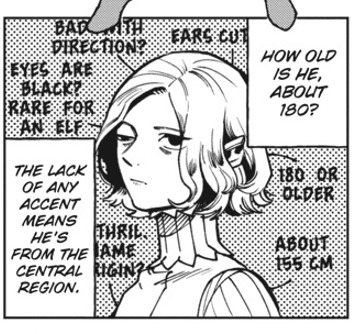
He treats him considerately and without bias, and despite the fact that Mithrun conquering the dungeon for the elves is both a reenactment of a core part of his childhood trauma and a political disaster for his aims, that doesn't seem to colour his perspective on Mithrun negatively at all.
This is something I find extremely laudable about Kabru, and it's another way he parallels Laios. He seems to understand that people, as a rule, (in Laios' case, he understands this about monsters - and eventually, all living beings) will act in their own interests, and if those interests conflict with yours, might harm you. But that's just their nature, and it's not something that should be held against them; you're also doing the same thing, after all. The crux of Laios' arc is precisely that he has to accept the responsibility of hurting someone else in order to achieve what he wants.
Kabru is deeply concerned with his own morals, what he should and shouldn't do, but mostly in the context of responsibility for the consequences - a responsibility he takes onto himself. He isn't scrupulous about what he needs to do in order to create the outcome he wants, but if he fails to create that outcome, then....
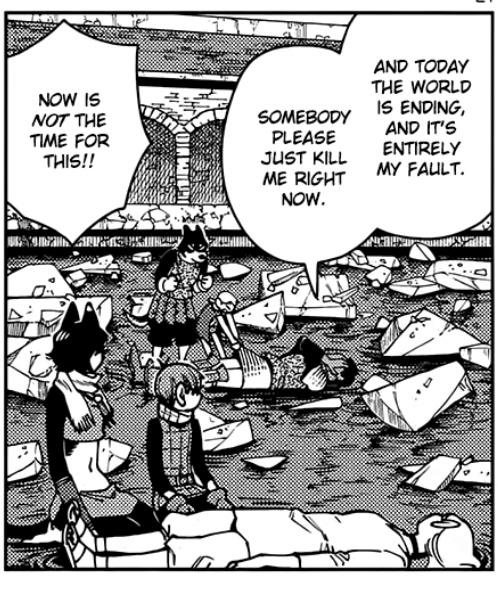
He blames himself to the point of thinking he should die. He doesn't blame Laios, or seem at all angry with him, despite concluding he should have killed him to prevent this outcome. That's because in his eyes, ultimately Laios was going to act according to his own nature, and it's Kabru's fault for not understanding that nature well enough. He's extremely confident in his ability to understand and predict others, (including elves and other long-lived people). Then, where does his conviction that mutual understanding is impossible come from?
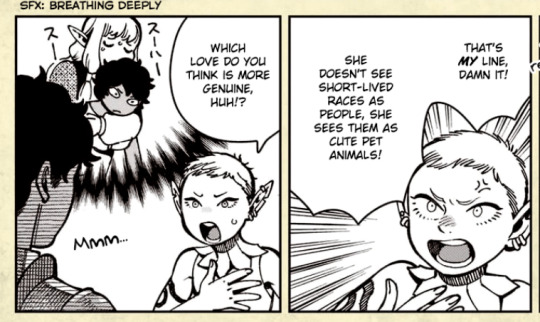
Partially, it's the "mutual" part. I'm sure Kabru, who isn't able or willing to deny Otta's insinuation that Milsiril saw him more like a pet than a son, has felt that his full interiority, the depth of his feelings and his ability to grow, act, and think as a fully equal being, was something that the elves around him just couldn't grasp. Because that was their excuse for it, he came to understand this as a gulf between short-lived and long-lived beings, an inevitable difference in outlook caused by their different lifespans.
This experience might be part of what leads to his iconic “fake” behaviour. He trusts his ability to understand others, but if they aren’t able to understand him, then there isn’t any benefit to being honest about his feelings and thoughts. If his attempts to reach mutual understanding with his caretakers were never able to be fulfilled, then it isn’t any wonder that he reacts with such surprise and horror at blurting out his desire to be Laios’ friend.
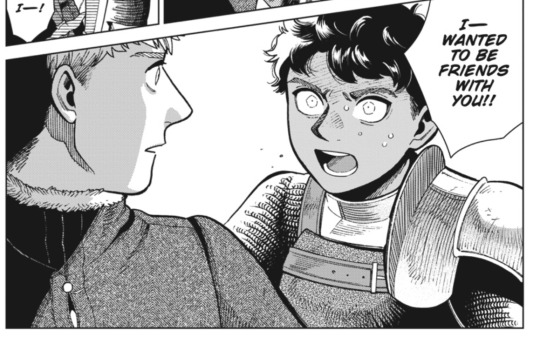
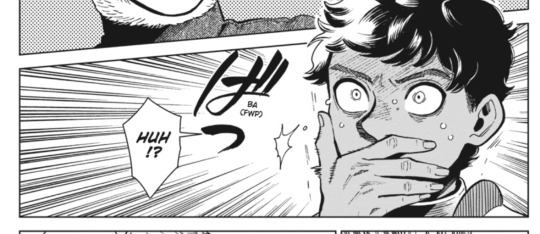
In his experience, making yourself vulnerable in that way only leads to being hurt. Soothing him, hushing him, lying to him, talking to him like a child that isn’t able to use proper judgement – that’s an inadequate and deeply hurtful way to respond to genuine distress, the desire for autonomy, or disagreement. Ultimately, I think that’s why he comes out on the side of being grateful to Milsiril; because she did equip him with the skills and knowledge he’d need to reach his goal, and let him go.
Though he could understand them, they couldn't understand him. To the extent that was true - which I'm sure it was - it wasn't due to anything about lifespan. It was due to the elves’ racism, and the solipsitic mindset & prejudiced attitude that it caused them to approach him with.
Because, if it needs to be said, the idea that there is an unbreachable gap in understanding between the long-lived and short-lived species is not true. Marcille and Laios have a much greater difference in lifespan than any full elf from any short-lived person, and they’re able to understand each other – maybe not perfectly, but better than many other people who are closer in life-span to them.
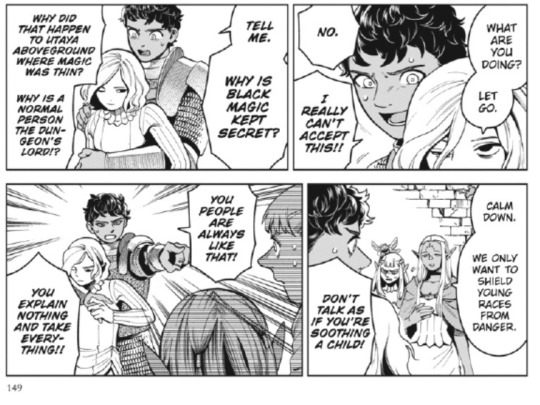
That doesn’t mean that I think Kabru is wrong about this, however. Because there’s an interpretation of his statement that is reflected in his actions and is true. When he talks about his problem with elves, it’s not just their attitudes: it’s their power, and what they use it to do. They “explain nothing and take everything”. Though it’s presented in the guise of ‘guiding and protecting’, in fact it’s a simple case of a powerful nation using their military power, wealth, access to resources, and historically stolen land – including the island itself – to protect their own interests and advance their own agenda. That’s why they’d be able to show up, seize the dungeon, and forcibly take Kabru’s party and Laios’ party to the West. If Kabru wants to stop that from happening, or change that status quo, persuasion or a bid to be understood would be completely pointless. Between the political blocs formed by long-lived species and the interests of short-lived species, “mutual understanding”, given their current, unequal terms, would be impossible. This is something that we see reflected in Kabru’s actions; before he asks his questions about the dungeon, he grabs Mithrun as leverage. He never really attempts to persuade the canaries to see his point of view, because that would be pointless: they’re agents of the Northern Central Continent’s monarchy, and will act in its interests regardless of any individual relationship with him.
I don’t think Kabru sees the different dimensions of this belief of his in quite such clear terms, however, as is evidenced by the other group who he thinks it’s impossible to communicate with.
Demi-Humans & Unknowable Objects
The other place that we see his conviction about the impossibility of mutual understanding is in the kobold extra.
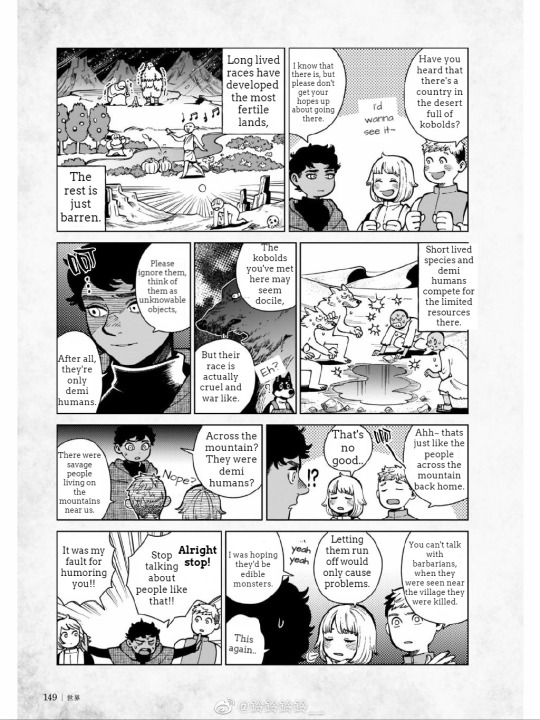
I'm including the whole thing, because I think it's an excellent and clever piece of world-building. Aside from what it says about Kabru, which I'll expand on shortly, what this extra does is deconstruct and call into question the usual "fantasy ontological biology" present in these sort of DnD-like settings. Essentially, the kind of worldbuilding where a race (such as kobolds) can be described as war-like, and that's establishing something essential about their biological nature. That's common to the point that if Kui didn't include this, some people would probably come away thinking that's the case about, e.g., the orcs.
But here, despite what Kabru is saying, the information the reader actually gets is:
the conflict between short-lived humans and demi-humans such as kobolds is mostly over access to material resources that they need to survive.
These resources are scarce because powerful nations, such as the elves, have monopolised them.
Kabru, who has grown up in a place at the centre of these conflicts, ascribes essential, negative traits to a cultural group which was in direct conflict with his own. Communication with this other group is impossible; they aren't people, they're more like objects.
oh yes! just like this conflict between groups of tall-men, a conflict which the reader will immediately interpret as more clearly analogous to real-life racism. Our other protagonists also carry prejudices from growing up in a place where a marginalised group was in conflict with the dominant group over scarce resources. It's definitely impossible to communicate with these people, and you can only kill them.
Woah, when you say it like that, it sounds pretty bad!
But also, nobody walks away having had a realisation or unlearned their prejudices - because they don't have the tools they need to do that work. Yet. I do think, to an extent, it could happen - especially with Kabru, since it's suggested in the epilogue that Melini might become a safe-haven for demi-humans.

To focus in on Kabru, the key here is his statement that you should think of demi-humans as "unknowable objects". Even his extraordinary powers of understanding have seemingly hit a limit. Part of this is just inherited prejudice, and doesn't need to have a complicated psychological explanation, any more than the elves who were prejudiced against him need one.
But also... this is probably somewhat linked to the way demi-humans seem to be considered "pseudo-monsters". They're the place that the strict delineation between the human and the monstrous is permeated. Laios, who is not interested in humans, remembers and is excited by Kuro. Chilchuck and Laios argue over whether it's OK to eat a mermaid. Kabru's prepared to (pretend to) roll with the idea that Laios ate the orcs.
But these are people, aren't they? Of course, this is a social construction, as we see from the fact that in the Eastern Archipelago, the label of "human" is reserved for tallmen, but in most of the rest of the world it depends on some obviously arbirary classification based on number of bones; "demi-humans" aren't in any essential way monstrous, except to an extent in their appearance, and physical location - due to their marginal social status, they're pushed out to live in unsafe places such as dungeons.
Therefore, Kabru's view of demi-humans as fundamentally "other", unable to be understood - monstrous - could be read as akin to abjection, the psychoanalytical concept described by Julia Kristeva. In order to create a bounded, secure superego, that thing which permeates and calls into question the border between self and other, human and animal, life and death, is rejected and pushed to the margin.
“Not me. Not that. But not nothing, either. A "something" that I do not recognize as a thing.[...] On the edge of nonexistence and hallucination, of a reality that, if I acknowledge it, annihilates me. There, abject and abjection are my safeguards. The primers of my culture.” (Kristeva et al., 1984, p. 11) “It is thus not lack of cleanliness or health that causes abjection but what disturbs identity, system, order. ” (Kristeva et al., 1984, p. 13) “The pure will be that which conforms to an established taxonomy; the impure, that which unsettles it, establishes intermixture and disorder. [...] the impure will be those that do not confine themselves to one element but point to admixture and confusion.” (Kristeva et al., 1984, p. 107) (discussing food prohibitions in Leviticus)
This is both (due to its affinity with food-loathing and disgust) a very fruitful concept to apply to dunmeshi, and a psychoanalytical theory which I wouldn't exactly cosign as True Facts About Human Psychological Development. You may also know the abject from its utilisation in the classic essay "Horror and the Monstrous-Feminine" by Barbara Creed - that's a lot more approachable than Kristeva if anyone's interested.
Key here, though, is that through the symbol of the "demi-human" is embodied a step between "human" and "monster" - and that's a prospect that puts at risk the whole notion of an absolute separation between those two categories in the first place. To Laios, that's something wonderful, and to Kabru, it's terrifying. We can see this principle further embodied in the relationship both characters have with the notion of becoming monstrous.
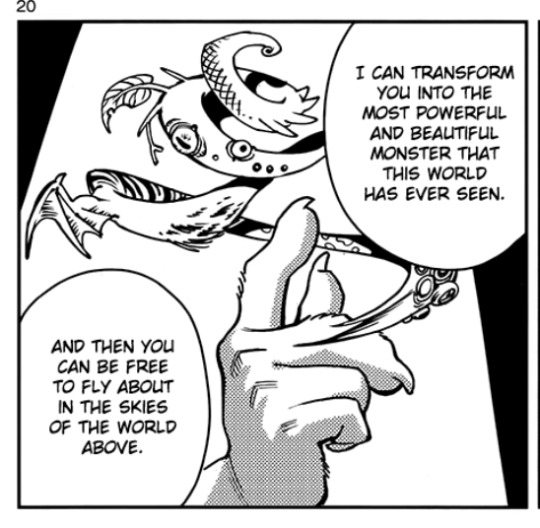
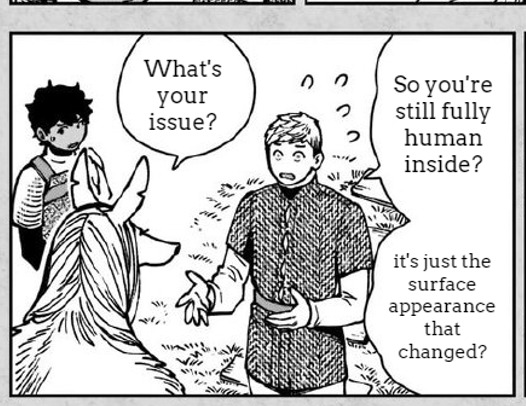
To Laios, this is transcendent, and represents a renunciation of everything human - in fact, if it didn't, it wouldn't "count".
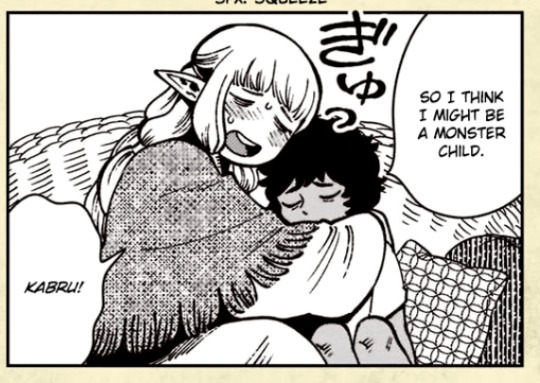
To Kabru, it's a deeply-held fear, established by his childhood alienation (due to his illegitimacy, his eyes, and perhaps also his neurodivergency), deepened by monster-related trauma and the sense of responsibility and survivors guilt he feels for what happened at Utaya. His identity as a human who is not monstrous is key to his sense of stability and safety; he doesn't want to touch monsters, he doesn't even want to see them.
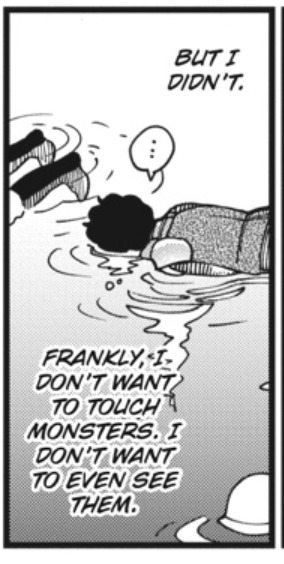
To acknowledge a kinship, a possibility of similarity between the things he loves (humans) and the things he hates (monsters) would be more than touching them - it would be putting them inside him. We know, quite explicitly, that this notion is triggering to Kabru. He literally has what seems to be a flashback when he's about to eat the harpy omelette.
So he abjects it, classifying the demi-human as fundamentally unlike him - an unknowable object, or an object that he refuses to know. Because in understanding it, he would interject the things he hates and fears into his self, which is already, always under threat by that hated and feared object.
Of course, again, Kabru isn't very good at enacting this refusal in practice. For one, when he chooses between his desires and ingesting the feared object, eating monsters... he eats monsters. Part of this is treating himself badly, the "ends justify the means" mentality. His goal is to destroy all monsters, so if he needs to become monster-like to do that, he will. But part of it is also the other motivation that he didn't even seem to know about until he said it: he wants to become Laios' friend, and to learn from him how a person can like monsters. He wants, at least in some part of him, to reconcile the feared and hated object into something he can understand.
For another:
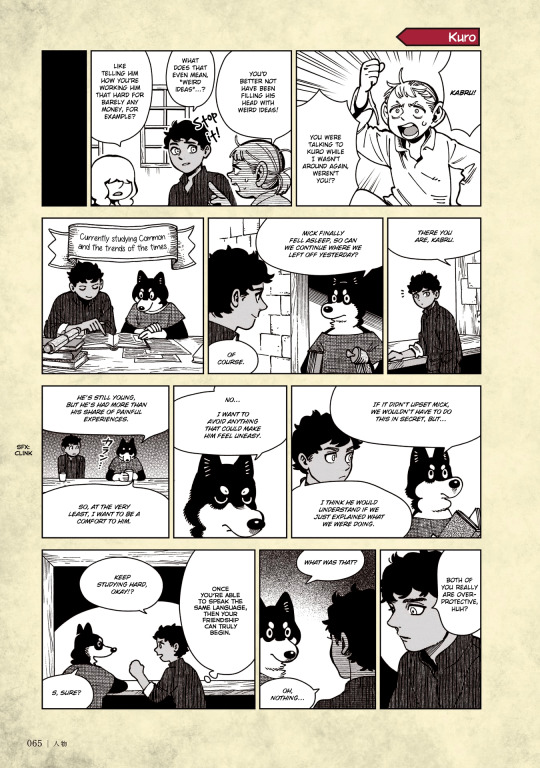
Kabru can speak the kobold language. In the first place, while this may have been common in Utaya, it also could have been something he chose to learn, an early expression of his interest in understanding and talking to all sorts of people. It isn't the kind of thing you learn if you believe that communication between yourself and the group that speak it is impossible, is it?
It's possible to harbour prejudices against a group while being kind to an individual, and given Kabru has those prejudices regardless of his reasons, that is what he is doing. But also, his treatment of Kuro doesn't reflect a sincerely held belief that he's an "unknowable object" at all. His approach is exactly the same as it is to any other person: an analysis of goal and motive, and an attempt to help if he's sympathetic and their goals align - going out of his way to give language and local knowledge lessons in secret. His conviction that Mickbell and Kuro will truly become friends when they can properly communicate is completely contradictory to any sense of demi-humans as fundamentally different, or impossible to reach mutual understanding with. To me, it seems like this self-protective shield against the corruptive force demi-humans as an idea present to his identity, this abjection, when Kabru is face-to-face with one, just simply can't hold up against his finely honed skill of intellectual empathy. Perhaps because he's autistic, it seems his "empathy" is less an emotional mirror response, and more a set of cognitive skills for analysis of others. That instinctual, emotional empathy might not trigger when presented with a member of an out-group, but if it’s possible for Kabru to turn his cognitive empathy off, we don’t see him do it.
This isn't to say that this prejudice doesn't affect his behaviour. For one, it could negatively impact his judgement of politics and policy, where individual people don't enter into it. For another, I'm not convinced he'd be willing to overlook Mickbell's exploitative relationship with Kuro if Kuro wasn't a kobold. As it is, since both of them are satisfied, he doesn't feel like he needs to intervene, regardless of the fact Mickbell isn't paying Kuro. But if Daya and Holm were in a relationship, and Holm took both Daya's and his own share from their ventures, but only compensated her in living expenses and kept the rest, do you think he'd tolerate it, for example? Even if she said it was OK?
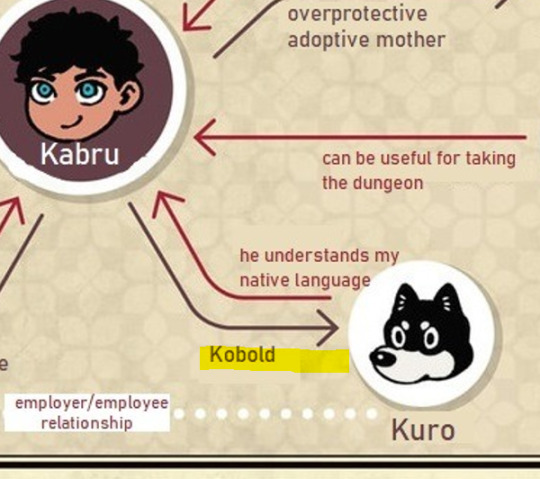
Conclusion

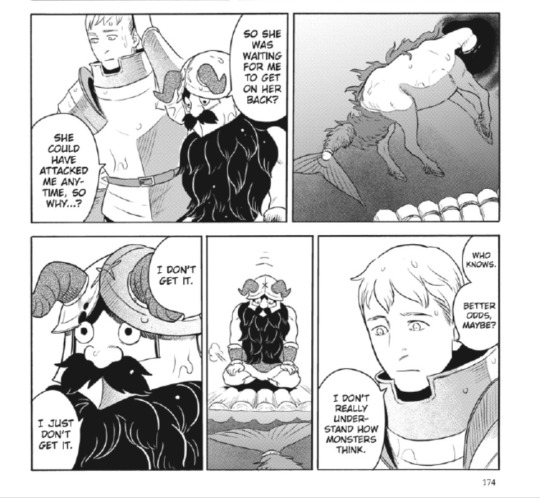
The kelpie chapter establishes that "people can never know what monsters are really thinking." That isn't just true of monsters, though.
True mutual understanding is impossible - between anyone. We can never truly understand another person's heart. This is touched on in, for example, the existence of shapeshifters and dopplegangers. Even a monster that seemed like a perfect copy of a person wouldn’t be that person, and wouldn’t be a satisfactory replacement.
We’re intended, I think, to understand the winged lion's repeated suggestions to just replace people who have been lost with copies as something uncanny, which demonstrates the way that the winged lion never manages to attain a complete understanding of humans. A version of a person who was created to fulfil your memories of them, to be the person who you wanted them to be, would be a terrible, miserable thing.
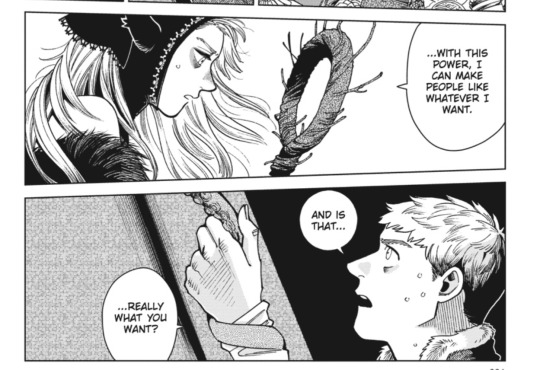
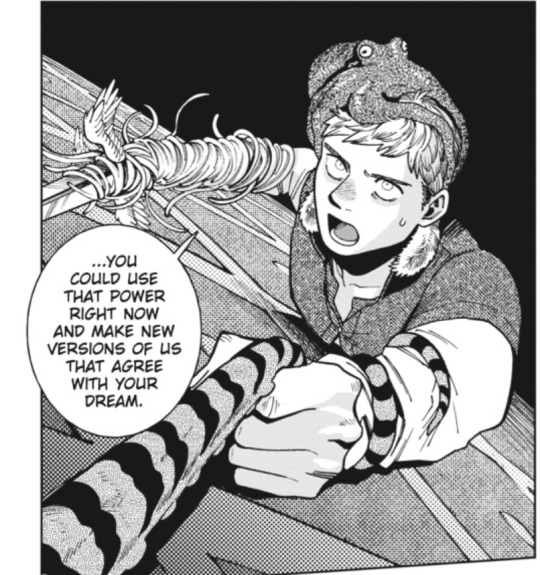

Disagreeing, coming into conflict, and misunderstanding each other, are essential parts of what it means to be living beings, as fundamental as the need to eat.
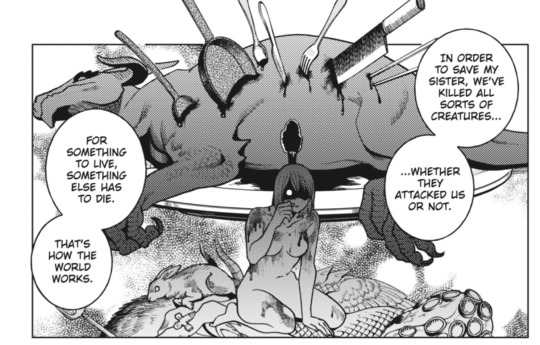
The only thing to do is not to take more than you need to eat to survive, and not impose your own desires onto others. To do your best to sincerely communicate your desires, even if they're embarrassing or vulnerable or strange, like Kabru eventually does with Laios; like Laios does, bit by bit, with the people around him; like Marcille does, Chilchuck does, Senshi does... to hope they will accept you, and do your best to understand them in return.
We can re-examine, in that context, Kabru's line about the elves' tendency to "explain nothing and take everything".
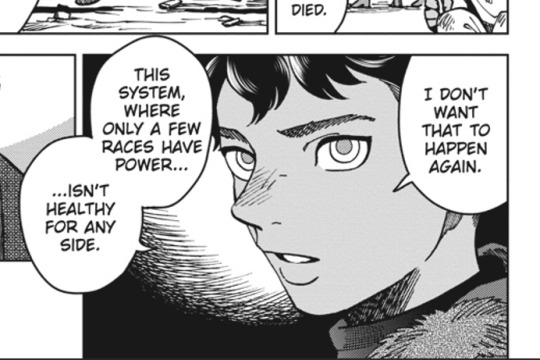
They have the power to impose their preferred "menu" onto less powerful groups. And in that context, mutual understanding being impossible just means that they won't give up their power because they're asked nicely. Kabru's goal is to seize the truth that they won't give to him, and to create a situation where they can't take everything. Because he's accurately surmised that nothing about the treatment of short-lived races will change so long as the power imbalance remains. Despite the way he mistakenly ascribes part of that to "long-lived vs short-lived" or "human vs demi-human", the actual gulfs in understanding he identifies are structural, are about power and about access to material resources and safety.
I think he could come to recognise this. Yaad is teaching him political science after all, and while a prince's lessons on political science won't exactly get at much that's radical or invested in the interests and perspectives of the marginalised (Capital is a critique of for a reason after all...) I believe in Kabru's ability to learn critically and get more from a lesson than it was intended to teach.
#so worth the read#and honestly quite inspiring#there’s so much to Kabru’s character and how our understanding of him really fleshes out the world of dungeon meshi#his motivations inform the audience of big stakes like racial politics and heirarchy#when you think of his upbringing around elves and having lost his home it really makes sense why he’s hyper aware of social dynamics#it’s as much a survival mechanism as it is a deep passion#and these things are often two sides of the same coin in dungeon meshi#i’m going to keep coming back to this post because there’s sooo much here to disect#and just so well written and thought out too#essential reading for Kabru lovers#kabru of utaya#dungeon meshi#delicious in dungeon#loriache#thank you op!
2K notes
·
View notes